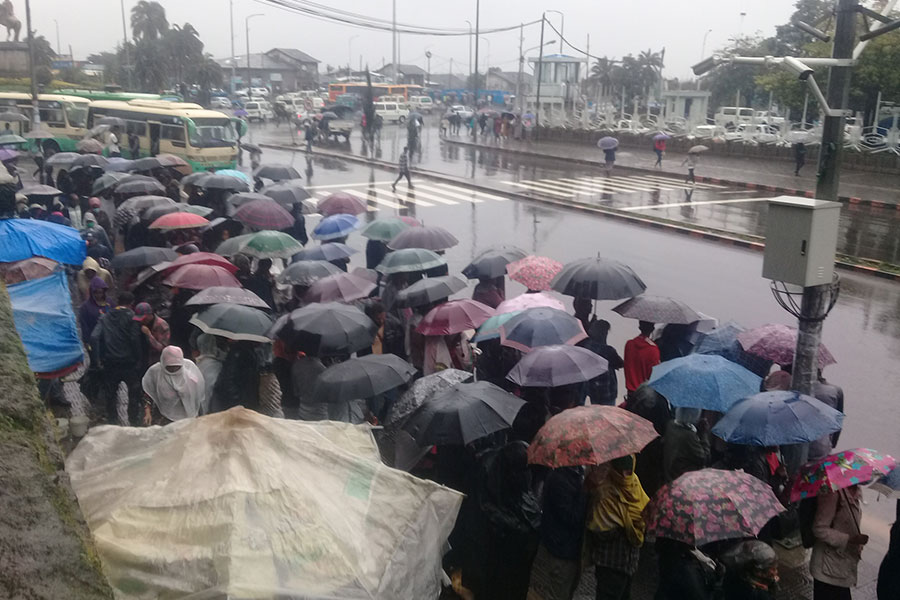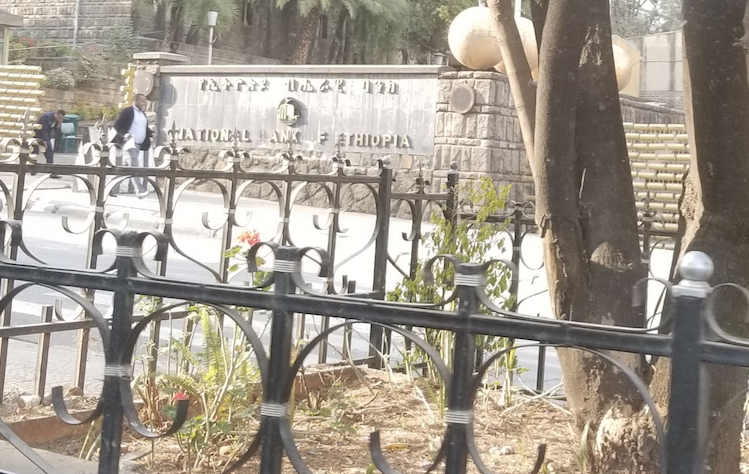
Radar | Aug 13,2022
Feb 11 , 2023.
"Compassion is a state of mind unable to bear the sufferings of others. If we all have more compassion, there would be greater peace in the world."
Dalai Lama
Once again, the vectors of turmoil and widespread discontent are rearing heads amidst a dual process of progress in the path of - hopefully - a durable peace. Last week, the federal government restricted communications using Facebook, TikTok and Telegram, a grim reminder that the euphoria of “reform” might have come a full circle as a rude awakening to many of its ardent fans.
The bubbling tension has escalated into confrontations between the state and the leaders of one of Ethiopia’s most prominent religious denominations. If mishandled, as many public affairs have been, the consequences will be dire, including for millions beyond the frontline of the altercation. Empathy is required from all those in the dividing lines. The last thing Ethiopia could afford is another cycle of conflict encasing society and mobilizing various groups away from non-violent engagement to deal with differences, however sharp their blades could be.
After two years of gruesome and bloody civil war, causing death to hundreds of thousands, if not inflicting immense suffering and pain to millions, Prime Minister Abiy Ahmed (PhD), alongside his deputy Demeke Mekonnen and senior advisors, sat at the same table with Getachew Reda, chief negotiator for the TPLF, and Tsadikan Gebretensae (Lt. Gen.) and Tadesse Werede (Lt. Gen), military commanders of armed forces in Tigray.
They may have discussed substantive issues on implementing the accords reached in Pretoria, South Africa, and the follow-up declarations made in Nairobi, Kenya. Differences may have also surfaced in the sequencing of the federal budget release to the administration of the Tigray Regional State and how the interim government should be constituted. However, the meeting signals that the two parties have agreed to conduct a face-to-face brush. The delegation members from Meqelle ought to have felt the federal assurance authorities granted them warranted their presence.
It may not serve any purpose now to remind these leaders that the peaceful and constructive dialogue they have embarked on would have saved so much for millions had it been before they opened lethal guns against each other. What had transpired over the past two years is nothing but regrettable, if shameful.
Nonetheless, the recent direct meeting between leaders of the federal government and the TPLF can be seen in the spirit that history provides a valuable lesson to avoid past mistakes. It should be taken as a welcome development considering the mutual animosity and deep mistrust that led the two to a full-blown civil war for over two years, putting the country down to its knees.
The recent encounter between Addis Abeba and Meqelle can also be seen as a watermark moment in moving the debacle between the two on the path of peace. It also should serve as an inspiration to transform Ethiopia’s society from the chaos of a bloody civil war to a peaceful state of constructive political dialogue, helping to achieve inclusive negotiated settlements. The longing for creating an open, tolerant, accommodative, and rule-based society remains alive, however insignificant the size of its core constituency.
This could prove to be an endeavour complex in nature, challenging in the process, and frustrating in its pace. After all, Ethiopia’s quest for peace has too many foes and detractors. Unlike peace in captivity, a negotiated peace is not popular as it is a historical anomaly. Nonetheless, its predicaments – whatever their depth and complexity – cannot be more intricate and unfathomable than the world has seen with South Africa, Northern Ireland, Bosnia-Herzegovina, and Rwanda. With patience, determination, and a willingness to compromise, it is possible for leaders to turn the tide of history for the better.
Having an understanding and internalizing the fact that collective grudges leading to civil wars and militarized conflicts cannot be solved by force is vital. The urge to deny adversaries recognition and the temptation to annihilate them through brutal force has hardly succeeded anywhere in the world. Today’s victory can only leave behind the seeds of tomorrow’s rebellion.
The alternative to dealing with deep-seated grievances could be an inclusive platform for dialogue and negotiations open to all parties who feel aggrieved and in conflict, regardless of political affiliations or convictions. Respectful and constructive discussions between the conflicting parties nurture a sense of shared ownership of the process.
Such a goal is hard to achieve without inclusive and transparent engagement. Too many efforts in the past, whether in Ethiopia or elsewhere, failed because these processes were rigged in favour of the powerful and to the exclusion of the weak and disadvantaged. And they are held in secrecy and away from the transparent scrutiny of the respective constituencies. Ironically, the detente between Addis Abeba and Meqelle is developing the symptoms of obscurity lately.
Both capitals are less enthusiastic about the importance of accountability for the massive human rights abuses committed during the war under their leaders’ watch. Millions remain victims of this needless war and deserve transitional justice before adversaries move on to political dialogue. Attempts to whitewash crimes committed against citizens without holding accountable those responsible for the crimes will, undoubtedly, pose a formidable challenge in the path of durable peace.
Nothing substitutes the indispensable role leaders play in dialogue and negotiations to overcome these challenges and change the national trajectory from a war footing to accountability, justice and settlements. Where there are no leaders with foresight and emotional intelligence, failing to understand fault lines and their historical contexts, transforming society into a peaceful and constructive course is an exercise in vain.
A society in the aftermath of civil war and militarized conflict, such as Ethiopia, suffers from collective loss, trauma, and deep-seated mistrust. It needs leadership that embodies reconciliation and justice while fostering a culture of compassion, forgiveness, and cooperation. Such leadership would have to pass roads fraught with frustrating obstacles, from polarization and historical grievances to economic hardships and challenges to accountability and resistance to changes by those vested interest in maintaining the status quo.
To overcome these obstacles, adversaries require inclusive and empathetic leadership and the willingness to engage in honest and transparent dialogue. Meaningful and constructive political dialogues are settled in the end, with deals reached and agreements signed by the parties involved. They are often codified and cemented in constitutions as a contract they enter with society.
Ethiopia’s existing constitutional order can be seen as a settlement of the wars and conflicts of the three decades before its ratification in the mid-1990s. Blamed for failing to be inclusive, it has dawned a new era of relative stability and order, unlocking an almost two-decade uninterrupted economic growth unprecedented in the country’s history.
The recent civil war, the continuous militarized conflicts, and the political discontent signal that it is about time to renegotiate the terms of this constitution. Constitutional amendments are long overdue; hence the reason to enter into a peaceful, institutional and lawful dialogue and negotiations on the many provisions that remain a subject of intense public debates.
The 11th since 2015, the suspension in response to protests and political turmoil earned Ethiopia the reputation as the notorious disrupter in the continent, alongside Sudan.
PUBLISHED ON
Feb 11,2023 [ VOL
23 , NO
1189]

Radar | Aug 13,2022

Sunday with Eden | Oct 07,2023

My Opinion | Oct 03,2020

Fortune News | Mar 07,2020

Fortune News | Jun 29,2025

Fortune News | Aug 29,2020

Life Matters | Sep 30,2023

Viewpoints | Aug 16,2020

Commentaries | Aug 20,2022

Agenda | Feb 12,2022

My Opinion | 132272 Views | Aug 14,2021

My Opinion | 128692 Views | Aug 21,2021

My Opinion | 126600 Views | Sep 10,2021

My Opinion | 124206 Views | Aug 07,2021

Dec 22 , 2024 . By TIZITA SHEWAFERAW
Charged with transforming colossal state-owned enterprises into modern and competitiv...

Aug 18 , 2024 . By AKSAH ITALO
Although predictable Yonas Zerihun's job in the ride-hailing service is not immune to...

Jul 28 , 2024 . By TIZITA SHEWAFERAW
Unhabitual, perhaps too many, Samuel Gebreyohannes, 38, used to occasionally enjoy a couple of beers at breakfast. However, he recently swit...

Jul 13 , 2024 . By AKSAH ITALO
Investors who rely on tractors, trucks, and field vehicles for commuting, transporting commodities, and f...

Jul 13 , 2025 . By YITBAREK GETACHEW
The Addis Abeba City Revenue Bureau has introduced a new directive set to reshape how...

Jul 13 , 2025 . By BEZAWIT HULUAGER
Addis Abeba has approved a record 350 billion Br budget for the 2025/26 fiscal year,...

Jul 13 , 2025 . By RUTH BERHANU
The Addis Abeba Revenue Bureau has scrapped a value-added tax (VAT) on unprocessed ve...

Jul 13 , 2025 . By NAHOM AYELE
Federal lawmakers have finally brought closure to a protracted and contentious tax de...